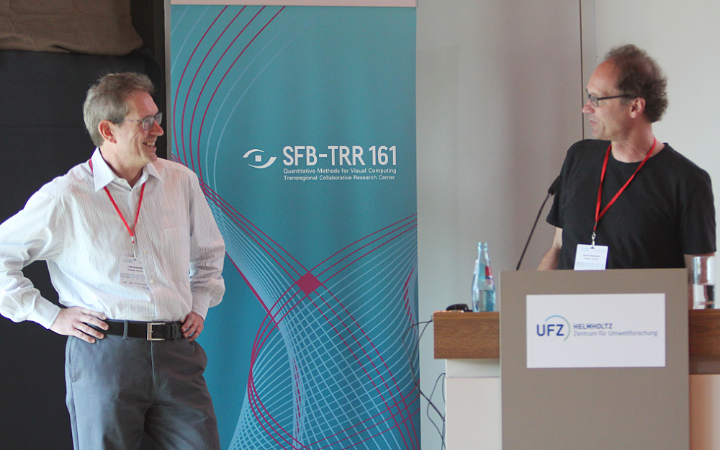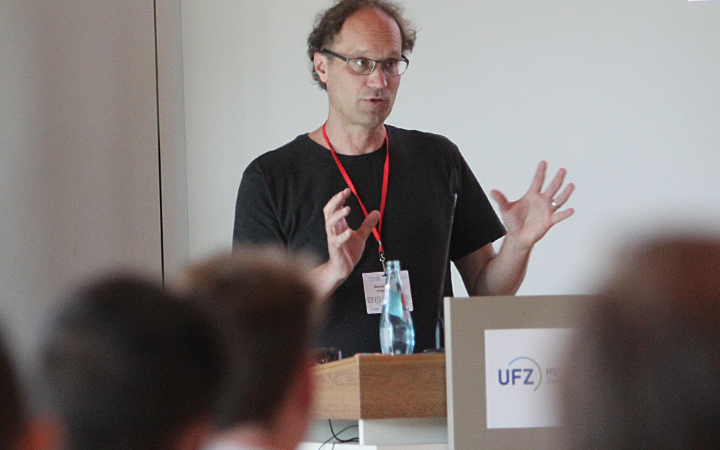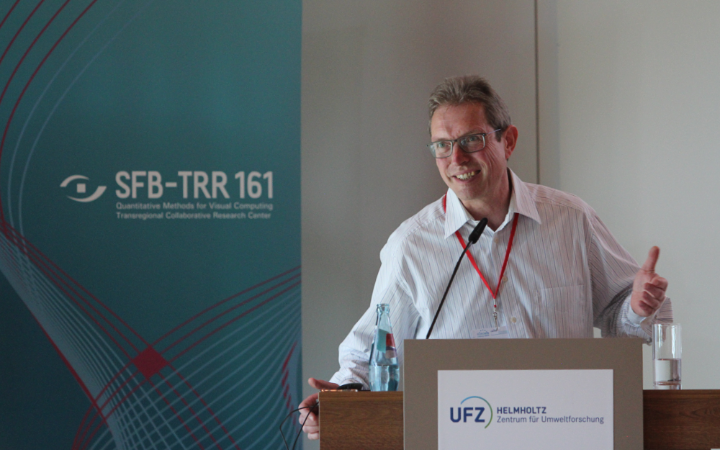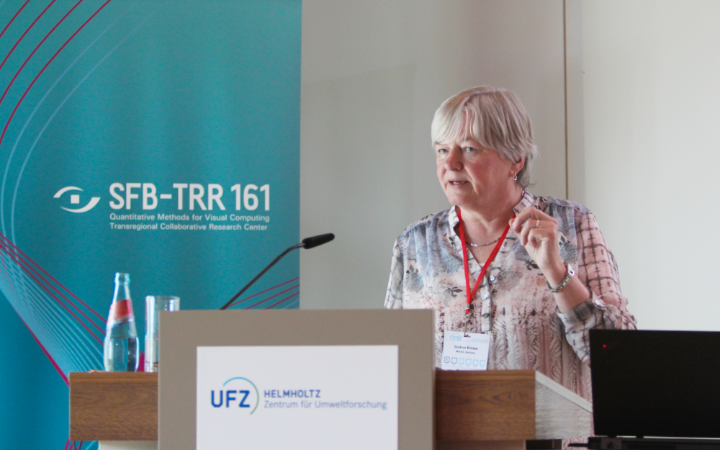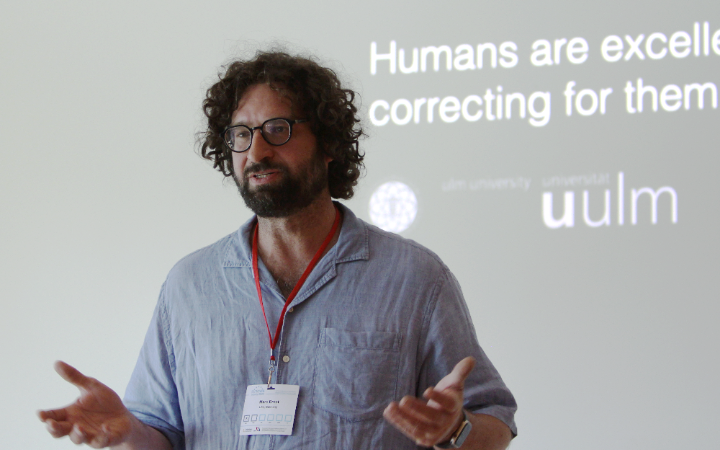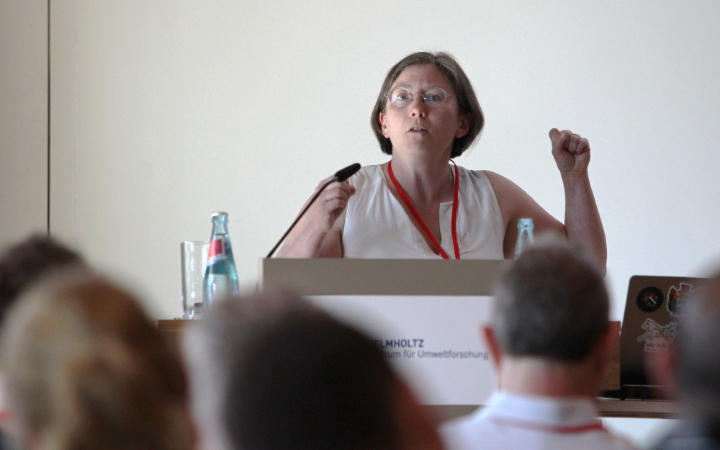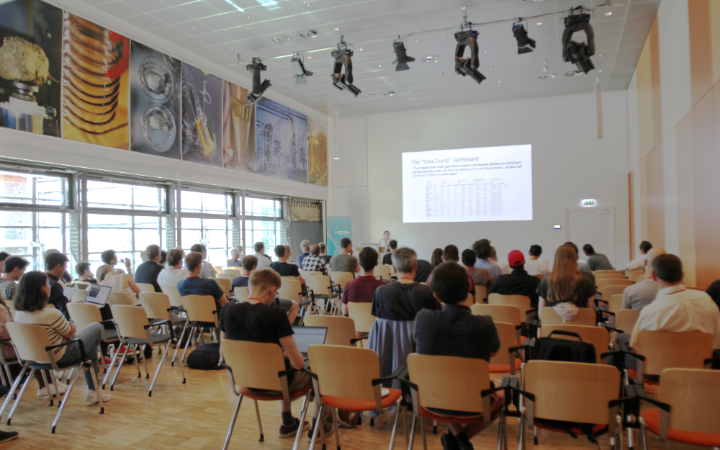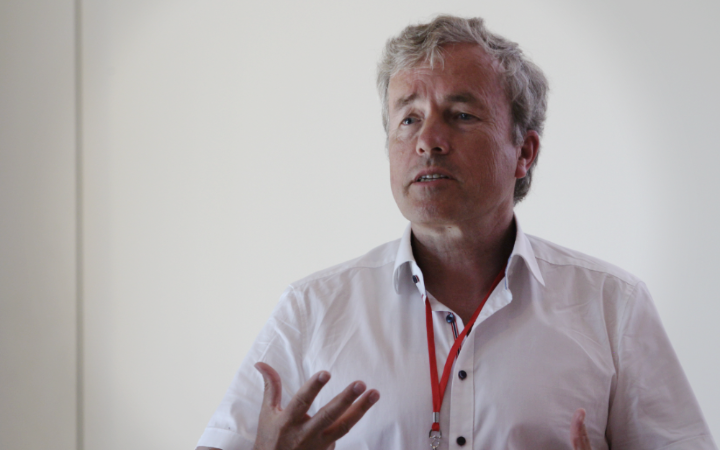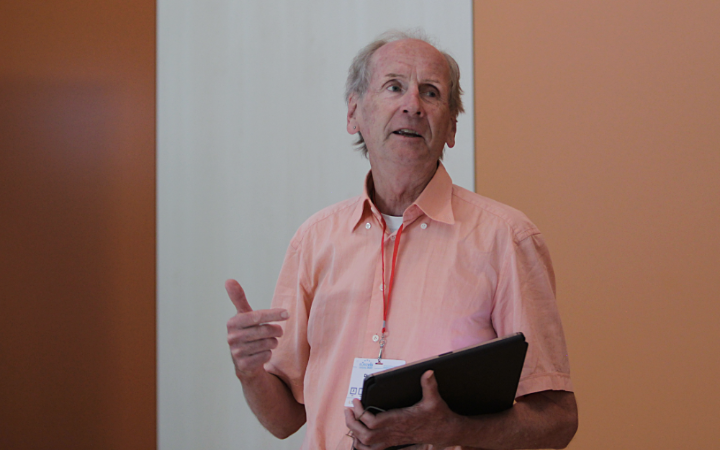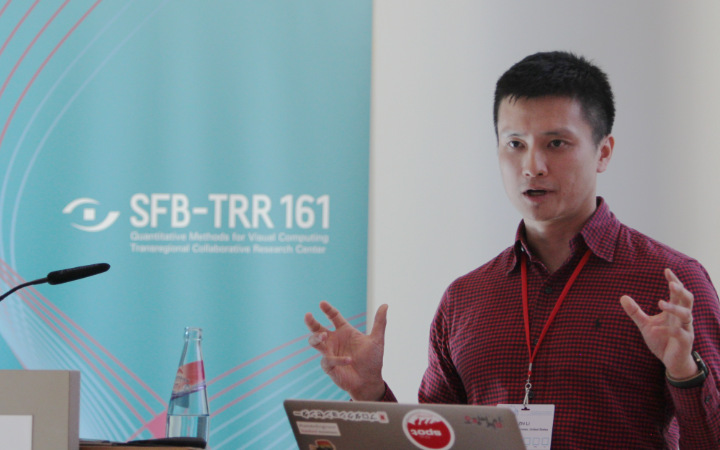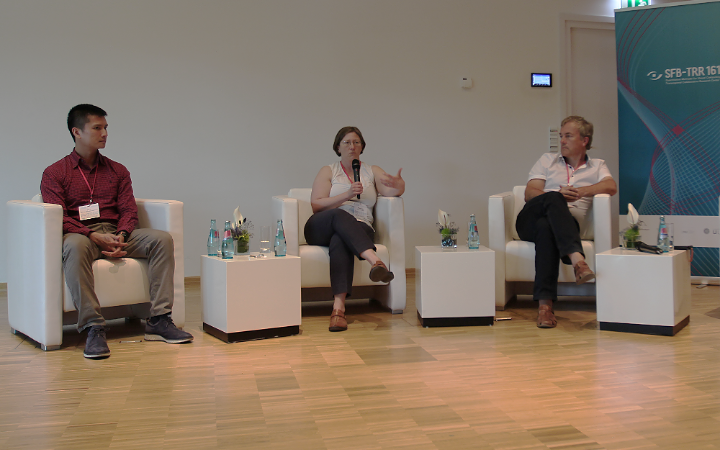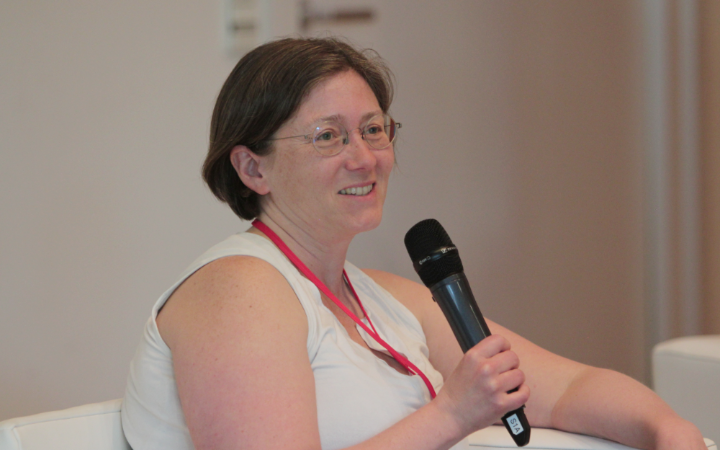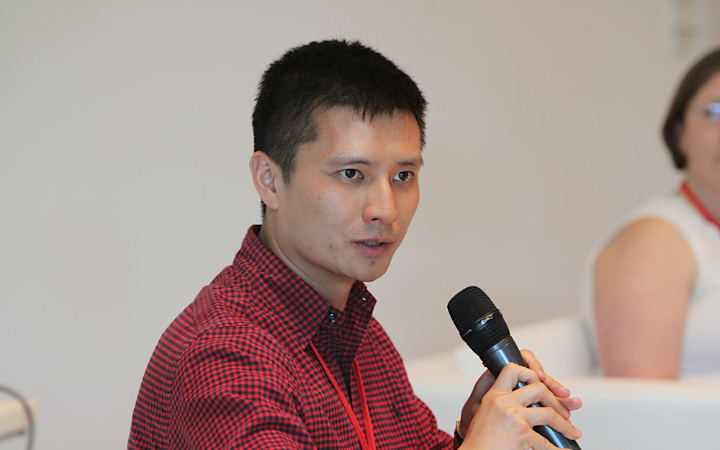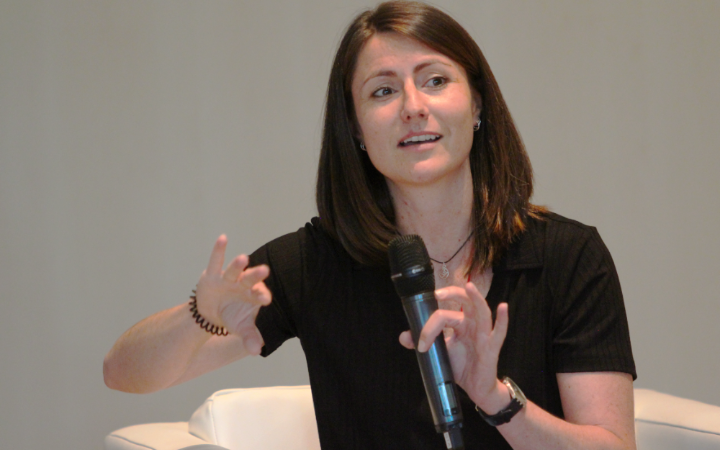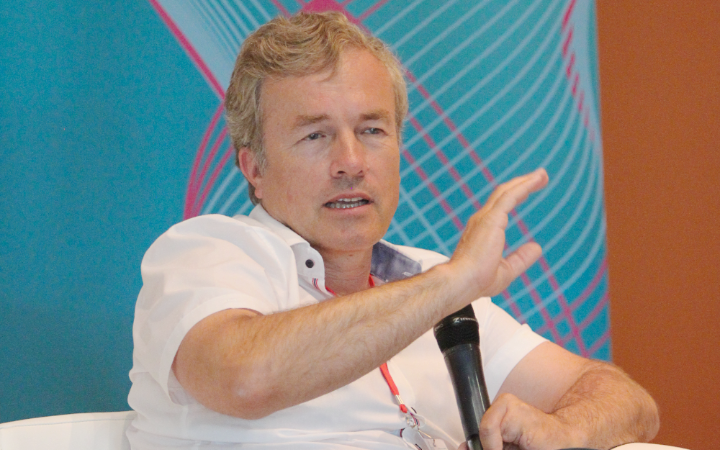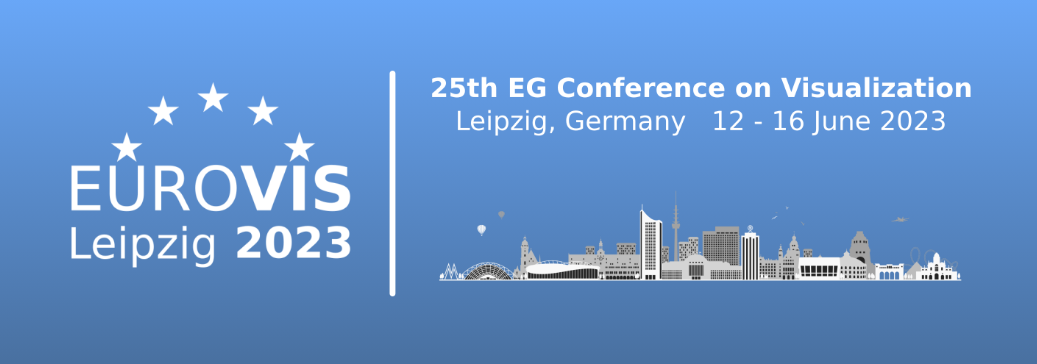2nd International Conference on Quantification in Visual Computing

Sunday, 11 June 2023
Leipzig, Germany
Leipziger KUBUS | Wissenschaftspark Leipzig | Permoserstraße 15 | 04318 Leipzig (Germany)
On June 11, 2023, the visual computing community from all over the world gathered at the Leipziger KUBUS for the 2nd International Conference on Quantification in Visual Computing (QiVC).
Invited Keynote Speakers
Gudrun Klinker
Professor for Augmented Reality, Technical University of Munich (TUM)
https://www.professoren.tum.de/klinker-gudrun
Keynote: Gamified immersive information visualization
Abstract:
We are surrounded by information while we work and live in the real world. Yet, most such information is not easily accessible, we are not aware of all of its relevance, and we may understand it differently than people next to us. Extended Reality (XR) has the potential to help us visualize such information on-site and integrate it directly with what we are doing. Yet, our co-existance in a real and a virtual world has many implications on how such information should or should not be shown. In this talk, Klinker will discuss issues regarding the spatial vs. functional properties of information, user overload and safety, as well as user motivation which should be raised via gamification.
Bio:
Prof. Gudrun Klinker, Ph.D. studied computer science (informatics) at the Friedrich-Alexander Universität Erlangen, Universität Hamburg (Diplom) and Carnegie-Mellon University (Ph.D.) in Pittsburgh, PA, USA, focusing on research topics in computer vision. In 1989, she joined the Cambridge Research laboratory of Digital Equipment Corporation in Boston, MA, working in the scientific visualization group on the development of a reusable tele-collaborative data exploration environment to analyze and visualize 3D and higher-dimensional data in medical and industrial applications. Since 1995, she has been researching various aspects of augmented reality, first at the European Computer-industry Research Center, then at the Fraunhofer Institute for Computer Graphics, and since 2000 at the Technical University of Munich. Here, her research focus lies on developing approaches to ubiquitous mixed reality that provide immersed user experiences in realistic industrial applications and in serious games.
Klinker is one of the co-founders of the International Symposium of Augmented Reality (ISMAR). She has served on numerous program committees such as ISMAR, VR, VRST, 3DUI, and UIST. She is author and co-author of more than 200 peer-reviewed scientific publications. She is a recipient of the Rober Sauer-Preis der Bayerischen Akademie der Wissenschaften, the ISMAR 10 Years Lasting Impact Award and the IEEE VR Lifetime Achievement Award, and she is an inaugural member of the IEEE VGTC Virtual Reality Academy.
Zhi Li
Manager, Video Codecs and Quality, Netflix
https://www.linkedin.com/in/henryzhili
Keynote: A lot of bang for the bit - delivering joy to Netflix members on a global scale
Abstract:
Video compression is immensely important to Netflix, as well as to Internet Service Providers (ISPs). It has been estimated that our codec optimization efforts, together with the Open Connect program, saved ISPs over 1 billion dollars in 2021 alone. At the same time, we strive to deliver to our members the best viewing experience possible. This means that we have to spend every bit wisely in a way that maximizes the perceptual quality of each video, on each device, in each streaming session. Naturally, such optimization requires a reliable way to quantify the observed quality. In this talk, I will cover our efforts towards developing more accurate methods of measuring the subjectively perceived video quality under different viewing conditions, and subsequently to distill the collective knowledge to build quality models that can be applied to our video compression and streaming process. I will close the presentation by discussing the immediate and future challenges ahead.
Bio:
Zhi Li leads a team of domain experts in video codecs and perceptual quality research at Netflix. The team actively contributes to the current AV1 codec and next-generation AV2 royalty-free video codec standardization under Alliance for Open Media. The team is also responsible for VMAF - Netflix's open-source video quality metric - that has been widely adopted by the industry. Over the past decade, Zhi actively contributed to Netflix's innovation in the video encoding and streaming pipeline, innovating subjective and objective methods of assessing perceptual video quality, helping Netflix earn two Technology and Engineering Emmy Awards in 2021. Recently, the subjective model and data cleaning method that he co-developed have been adopted in ITU-T P910, P913 and ITU-R BT500 standards. Zhi received his B. Eng. and M. Eng. degrees in Electrical Engineering, both from the National University of Singapore, Singapore, in 2005 and 2007, respectively, and a Ph.D. degree from Stanford University, California, USA in 2012.
Melanie Tory
Professor of the Practice and Director of Data Visualization, Khourgy College of Computer Science, Northeastern University
https://www.khoury.northeastern.edu/people/melanie-tory/
Keynote: Visualization in the Wild: Meeting the People Where They Are
Abstract:
The vast majority of people who use data in work settings are not professional analysts and may have no formal data or visualization training. For these data workers, data is a necessity to accomplish their goals, but rarely a goal unto itself. Unfortunately, there is a rather large chasm between the needs of data workers and the analytic tools available to them today. In this talk I will argue that as designers we can do better, through empirical research to understand the needs and experiences of people who are using data every day -- and deliberate design to meet them where they are.
Bio:
Melanie Tory is Director of Data Visualization Research at the Roux Institute, Northeastern University. Her team focuses on empowering people to do more with data, through the design and evaluation of novel visualization techniques, human-data interactions, and technology interfaces. She is especially focused on visualizations for health and engineering applications, and the interplay between visualization and AI, in alignment with other priority research areas at the Roux. In her previous role at Tableau, Melanie managed an applied user research team and conducted research in natural language interaction with visualizations, ultimately commercialized as Tableau’s Ask Data feature. She also worked as a faculty member in visualization at the University of Victoria, where she explored topics such as collaborative and personal visual analytics. Melanie earned her PhD in Computer Science from Simon Fraser University and her BSc from the University of British Columbia. She is Associate Editor of IEEE Computer Graphics and Applications and IEEE Transactions on Visualization & Computer Graphics, and has served as Papers Co-chair for the IEEE Information Visualization and ACM Interactive Surfaces and Spaces conferences.
Invited SFB-TRR 161 Speakers
Marc Ernst
Professor of Applied Cognitive Psychology, Ulm University
https://www.uni-ulm.de/in/psy-acog/team/marc-ernst/
Talk: Human-Machine Interaction with Adaptive Multisensory Systems
Abstract:
With the current boom of AI, also user-adaptive systems are becoming more pervasive. Designed to learn the characteristics of the user while interacting with them, they change their own features to provide users with a targeted, personalised experience. Such adaptability features can affect the displayed content, the human-machine interface itself, or the interaction capabilities of the systems. However, irrespective of the specific site of adaptation, users are likely to change their own behaviour in order to correctly interact with such systems, thereby leading to complex dynamics of mutual adaptation and learning. While it is clear that these dynamics can affect the performance, and therefore the design, of user-adaptive systems [Findlater & Wobbrock 2012, Ikemoto et al 2012, Nikolaidis et al. 2016], the scientific understanding of how humans and machines adapt jointly is, to date, still limited. In this talk I will describe some recent results obtained also within the SFB 161 and I will provide an outlook towards adaptable multisensory systems.
Bio:
Marc Ernst is professor for Applied Cognitive Psychology at Ulm University. He studied Physics in Heidelberg and Frankfurt/Main, before conducting a PhD at the Max Planck Institut for Biological Cybernetics in Tübingen/Germany, supervised by Heinrich Bülthoff. Following his PhD, which he was granted from Tübingen University, he conducted a postdoc at UC Berkeley working with Marty Banks on human multisensory perception and optimal observer modelling. In 2001 he returned to the Max-Planck Institut and became independent research group leader of the Max Planck Research Group on Human Multisensory Perception for Action. In 2011 he became full professor at Bielefeld University heading the Cognitive Neuroscience Group, before going to Ulm in 2016. Marc Ernst is interested in human multisensory perception, sensorimotor control, perceptual learning, human-machine interaction and the use of virtual reality and computational modelling for investigating human perception and action.
Oliver Deussen
Professor for Visual Computing, University of Konstanz
https://www.cgmi.uni-konstanz.de/en/persons/prof-dr-oliver-deussen/
Talk: Computing and Rendering Uncertainty
Abstract:
In most cases data comes with uncertain aspects. Visualizations are able to show them, but at the price of being more complicated to understand. I will sketch some techniques of data projection and visualization in which we integrated uncertainty by explicitly modeling (Gaussian) distributions. In the second part of the presentation different rendering methods for uncertainty will be presented.
Bio:
Prof. Deussen graduated at Karlsruhe Institute of Technology and is now professor for visual computing at University of Konstanz (Germany) and visiting professor at the Shenzhen Institute of Applied Technology (Chinese Academy of Science). He is one of the speakers of the Excellence Cluster "Centre for the Advanced Study of Collective Behavior" and vice speaker of the SFB Transregio "Quantitative Methods for Visual Computing", a large research project conducted together with University of Stuttgart. He is President of the Eurographics Association and served as Co-Editor in Chief of Computer Graphics Forum from 2012 to 2015. His areas of interest are modeling and rendering of complex biological systems, non-photorealistic rendering as well as Information Visualization. He also contributed papers to geometry processing, sampling methods, and image-based modelling.
Program
Click to view full conference program ▼
| 11:30 | Registration |
| 12:00 | Lunch |
| 13:00 | Welcome & Overview of SFB-TRR 161 (Daniel Weiskopf & Falk Schreiber) |
Session I (Chair: Lewis Chuang)
| 13:30 | Keynote I, Gudrun Klinker: Gamified Immersive Information Visualization |
| 14:10 | Q&A |
| 14:20 | SFB-TRR 161 Talk I, Marc Ernst: Human-Machine Interaction with Adaptive Multisensory Systems |
| 14:40 | Q&A |
| 14:45 | Coffee break |
Session II (Chair: Michael Sedlmair)
| 15:15 | Keynote II, Melanie Tory: Visualization in the Wild: Meeting the People Where They Are |
| 15:55 | Q&A |
| 16:05 | SFB-TRR 161 Talk II, Oliver Deussen: Computing and Rendering Uncertainty |
| 16:25 | Q&A |
| 16:30 | Coffee break |
Session III (Chair: Dietmar Saupe)
| 16:45 | Keynote III, Zhi Li: A Lot of Bang for the Bit - Delivering Joy to Netflix Members on a Global Scale |
| 17:25 | Q&A |
Session IV (Chair: Tiare Feuchtner)
| 17:35 | Panel Discussion with Gudrun Klinker, Melanie Tory, Zhi Li, & conference audience |
| 18:15 | Closing |
| 18:30 | Reception |
Events
This conference was co-located with EuroVis 2023.
Contact Conference Office
In case of trouble or questions related to the registration and conference organization, please don't hesitate to contact our support team Andreas Henneka (andreas.henneka@uni-konstanz.de) and Claudia Widmann (claudia.widmann@uni-konstanz.de). They will be happy to assist you in the best possible way.
Phone Conference Office: +49 7531 88 30 21
FOR SCIENTISTS
Projects
People
Publications
Graduate School
Equal Opportunity
FOR PUPILS
PRESS AND MEDIA
© SFB-TRR 161 | Quantitative Methods for Visual Computing | 2019.




